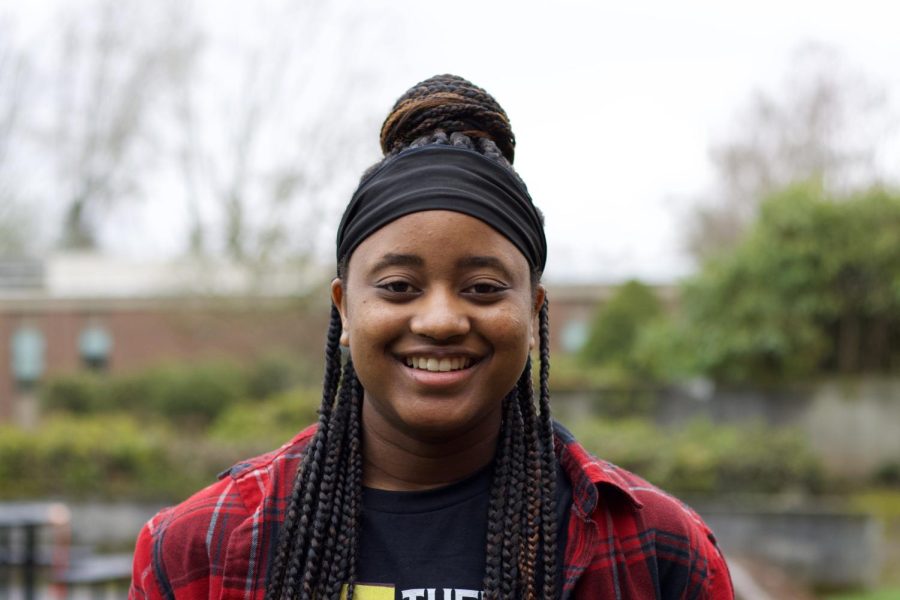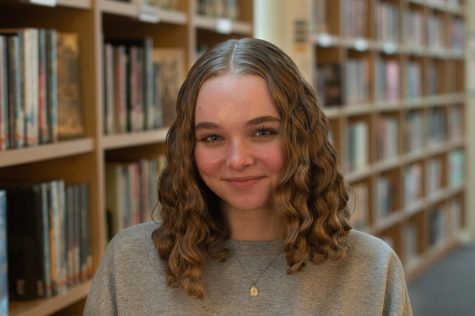“Through Brown Eyes”: How Junior Allie Ball Is Using Her Voice To Advocate for Social Justice
“I kind of hope that for any person of color, that there’s more platforms for us to be able to share our experiences and to be able to get up in front of people and speak about what we’ve been through and what our hopes and goals are,” she said.
February 2, 2022
On a summer day in June of 2020, junior Allie Ball stood before a crowd of more than 500 people, all gathered in a park in Milwaukie to show their support for the Black Lives Matter movement. Facing the group, Ball prepared herself to recite a spoken-word poem she had written just a few days earlier.
“I was really nervous,” Ball said. “But then I realized that these people are here for a reason. They want to hear what I have to say, and they want to help create change…It felt really amazing that I was able to share that piece of myself.”
Ball’s poem, called “How Long,” explored her experience growing up as a Black woman, and highlighted the manners through which many Black people have had to alter their identities in fear of how they will be treated. Since the day Ball first shared this poem with the crowd of protesters in 2020, she has found various other ways to use her voice to advocate messages around equity and social justice, including attending other protests and marches, speaking at La Salle assemblies, and creating her own podcast, “Through Brown Eyes.”
On her podcast, which she debuted around two months after sharing her first spoken-word poem, Ball has discussed topics such as the effects of social media during the Black Lives Matter movement, as well as the importance of voting and the ways this right has changed for people of color throughout U.S. history, among other issues.
In examining these topics related to racism and equity in episodes of her podcast, Ball said that her objective is to expand listeners’ perspectives and provide a window into what she and others “go through as people of color in America,” she said. She hopes her podcast will help others “to kind of just hear and feel and see some of the realities that we face.”
In addition, Ball expressed that she aims for her podcasts to reach an audience of both white people and people of color, and emphasized that “change has to come from both sides, not just one side fighting their own battles,” she said. “It has to be a unity, and so that’s really the reason why I started this podcast.”
Describing herself as an “extremely introverted person,” Ball conveyed that having a podcast as a platform to project her ideas “means a lot to me,” she said.
“Talking to people face to face is a little bit more difficult, so having a podcast was a way for me to get all my emotions and all my choices out without that face-to-face interaction,” she said. “But also, it’s helped me grow my confidence [that] I know these topics, I’m passionate about these topics, and when it comes to it, I’m able to talk to these people face to face.”
Ball said that the most difficult part of releasing episodes regularly is the time-consuming process of recording and editing these episodes, which was manageable over the summer, but has become less feasible during the school year. Because of this, Ball has not been able to produce an episode recently, but hopes to put another one out as soon as she has the time.
The process of creating an episode also becomes longer because Ball chooses to create her own soundtracks to incorporate into the audio of her podcast. “I also create my own beats, and so I wanted to overlay music with it,” she said.
In addition to developing a podcast and becoming involved in the Black Lives Matter movement through protests and panels, another way Ball has advocated for equity is by helping to organize assemblies and events within the La Salle community as part of the Black Student Union. At a recent assembly to honor Martin Luther King Jr. Day, Ball shared a spoken-word poem she wrote, an experience that she said was different from her experience speaking to the protesters in Milwaukie.
“I feel like when you’re up in front of a smaller community that you know, it’s a lot more nerve-wracking,” Ball said. However, Ball emphasized the importance of beginning to have conversations that can be uncomfortable within one’s local community, as this is how she sees change beginning. “It starts small and then it just gets bigger, and so starting within our community will only help it flourish,” she said.
Throughout Ball’s experience producing a podcast and finding ways to share her voice both within and outside of the La Salle community, she explained that becoming a part of the Black Lives Matter movement and pushing for more equity in her own community has “helped me realize a lot of things,” she said.
“I think this movement actually helped me realize what I wanted to major in in college, which is political science,” she said. The Black Lives Matter movement brought to Ball’s attention the fact “that there’s not a lot of people of color in government, and that if there [are] more, then we can help shift those things and pass legislation and bills,” she said.
After high school, Ball would love to participate in an internship or join a nonprofit organization that helps support people of color who are running for positions in office, she said, and then ideally, she would move up into an office of government herself. “The hope and the dream is Congress, but you never know,” she said.
In addition to helping Ball discern what she wants to pursue in her future, Ball’s endeavors in social justice have helped her realize that “you can’t fear rejection,” she said.
“If you just think about the people who aren’t going to listen, then that’ll be in your brain, and then you’ll start thinking, ‘Oh, well maybe I should accommodate this revision to accommodate that,’” she said. “But it’s so important to understand that not everybody is going to accept you, and not everybody’s going to want to fight for equality and for change, but you can’t think about those people, because that’s a small majority of people. You have to look at the bigger picture and realize that there are people who want to uplift your voice and who want to help you and just make change with you.”






Tom McLaughlin • Feb 3, 2022 at 11:57 am
First, Allie, thank you for your witness. My wife and I and my sisters heard you perform “How Long” at the Milwaukie Sit In, and you moved us deeply. You rocked it again at the MLK assembly. Numerous things you said for this article contain wisdom that I will benefit from. Keep speaking, keep being yourself!
And Mary, well-written article on an important topic. Thank you for this. Keep up the good work!